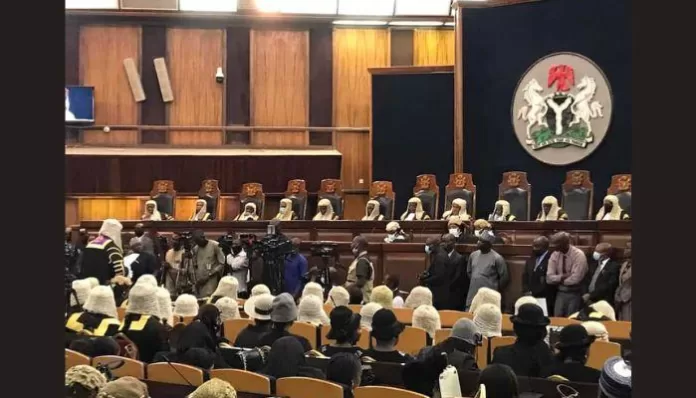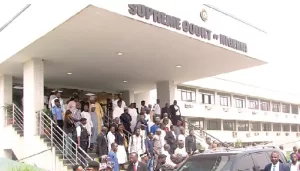The Supreme Court has reserved judgment in a significant suit filed by 19 states challenging the constitutionality of the Economic and Financial Crimes Commission (EFCC) Act.
This decision follows arguments presented by both sides in the case. Before the court reserved its judgment, Anambra, Adamawa, and Ebonyi states withdrew from the suit initiated by Kogi State and 18 others.
The seven-member panel, led by Justice Uwani Abba-Aji, struck out the names of the three states from the case, marked SC/CV/178/2023, after each state’s Attorney General separately requested their withdrawal.
The court granted unanimous consent to remove the three states from the suit. Earlier, Attorney General of the Federation, Lateef Fagbemi, SAN, sought the court’s permission to recognize a reply on point of law, which was also granted.
Notably, the Attorneys General of Nasarawa and Osun states expressed interest in consolidating their positions in the case. Counsel for Kogi State, Abdulwahab Mohammed, SAN, argued that the EFCC Act was flawed, claiming it was “a mere adoption of the United Nations Convention Against Corruption.”
He contended that the establishment of the commission did not adhere to Section 12 of the Constitution, which outlines the procedure for forming such bodies, urging the court to “abolish the anti-corruption agency.”
In response, Fagbemi countered that “the action or inaction of the former Attorney General of the Federation, Kanu Agabi, has no place in this at all.” He argued that the law did not mention the United Nations, emphasizing that “Section 15, subsection 5 of the 1999 Constitution backs the Nigerian state in abolishing all forms of corruption.”
Fagbemi warned that if the court proceeds to set it aside, “it would have many negative consequences, especially on previous decisions.”
As the hearing progressed, Imo, Bauchi, and Osun states joined the suit as co-plaintiffs, while Anambra, Ebonyi, and Adamawa states formally withdrew, leading the court to strike out their suits.
READ ALSO: Kogi, 15 other states want Supreme Court to declare EFCC illegal, curb its powers
The debate over the future of the EFCC continues to intensify among stakeholders. The agency has accused the governors of attempting to undermine its anti-corruption efforts.
EFCC Director of Public Affairs, Wilson Uwujaren, stated that the push to dissolve the agency arises because governors are “feeling the heat” of the anti-graft body’s work. He asserted, “If the agency is scrapped, Nigeria cannot survive.”
Uwujaren expressed disbelief at the situation, urging Nigerians to recognize the significance of the EFCC in the fight against corruption.
“Nigerians should see through this shenanigan and oppose it because I don’t see how this country can survive without the EFCC with the kind of corruption problem that we have,” he stated.


